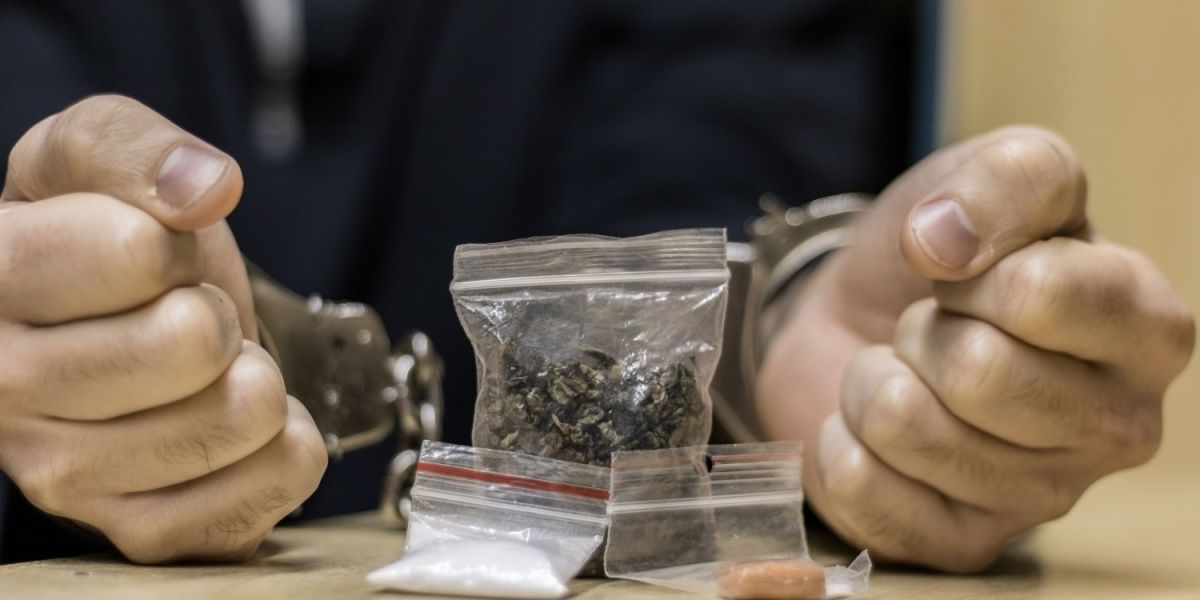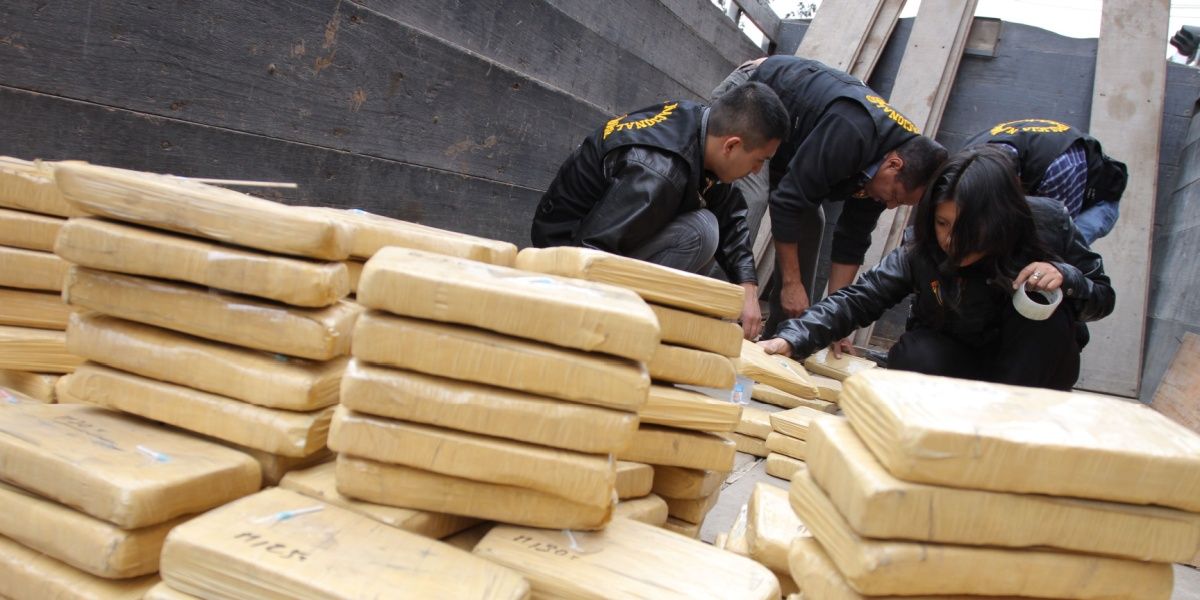Manufacturing controlled substances is a criminal offense that can be charged under federal or state laws. Drug manufacturing applies to the involvement in any part of the manufacturing process of any controlled substance. Penalties for drug manufacturing include prison time and fines.
- A felony charge for drug manufacturing is often a minimum of 1 year in prison and federal charges usually carry a minimum sentence of 5 years.
- Drug cultivation is considered the same as manufacturing in terms of legality and punishments.
- An individual can be charged with a drug manufacturing offense if they are involved in any part of the manufacturing process, including selling or buying chemicals used in the manufacturing process.

What is drug manufacturing?
Drug manufacturing refers to the illegal production of controlled substances without authorization or licensing. Manufacturing includes using chemical processes to prepare, process, produce, or convert substances into illicit drugs, such as methamphetamine and fentanyl. It also includes the cultivation of plants used for their psychoactive effects, such as marijuana and psilocybin mushrooms. [1]
An individual can be charged with a drug manufacturing offense if they are involved in any part of the manufacturing process, including selling or buying chemicals used in the manufacturing process or providing equipment or locations in which drugs can be made. [2]
To be charged with this offense, it must be proved that the individual knowingly possessed the drugs, chemicals, and equipment to manufacture controlled substances and that they intended to use these for drug manufacturing. [1]
Federal vs state manufacturing laws
Drugs are classified according to federal law under the Controlled Substances Act (CSA). This lists all substances as Schedule I-V, depending on their risk of physical dependence and abuse and whether they have any accepted medicinal use. [3]
Typically, it is a federal crime to manufacture any of these substances without authorization. Whether these crimes are dealt with at a federal or state level is dependent on the type and amount of drug, the size of the operation, and the number of people and states involved. [4][5]
Smaller-scale operations may be investigated and charged at a state level. In contrast, larger operations will likely be investigated by the Drug Enforcement Administration (DEA), a federal organization, and charged as a federal offense. [4][5]
Drug manufacturing offenses include the production of prescription drugs without the necessary licensing. Federal laws, including the CSA, regulate prescription medication manufacturing, while state laws provide additional specifics. [6]
Drug manufacturing is likely to be considered a felony, which may incur federal mandatory minimum sentencing laws. State laws tend to be similar to federal laws around drug manufacturing but often include specific details around the type and amount of drug, the classification of the crime, and the possible penalties. [1]
For example, some states include laws around the possession of precursor chemicals, making it illegal to possess substances that can be used in the manufacturing of certain drugs. [7]
State laws also vary from federal laws in regards to the manufacture of marijuana. Marijuana is a Schedule I controlled substance under federal law but many states have legalized or decriminalized recreational or medicinal marijuana use. Because of this, state laws can often conflict with federal laws and marijuana manufacturing may not be punishable by law. [1][2]
Intent to manufacture
Intent to manufacture is a necessary component of a drug manufacturing offense. An individual can be charged with drug manufacturing if they possess the equipment or substances required to produce a controlled substance, even if they have not yet manufactured the drug. It is, therefore, necessary to be able to prove intent to manufacture. [1]
Many substances, such as methamphetamine, are manufactured in a laboratory set up on private property. These in-house labs require several pieces of specialized equipment and various chemical substances to produce the drug. [7]
Many of these items are legal to purchase individually, so their possession may not immediately lead to a charge, as the individual could argue that they do not intend to use them for illicit purposes. As such, law enforcement must prove that the individual intends to manufacture drugs with these items. [1][2]
This requires evidence such as: [8]
- Finding extensive evidence of drug manufacturing equipment and precursor chemicals
- Finding various chemicals that are produced throughout the manufacturing process
- Evidence of a manufacturing and distribution operation, such as large amounts of cash, firearms, and weighing scales
- Internet searches relating to setting up a laboratory or how to manufacture the drug
Penalties and sentencing for manufacturing charges
The penalties for a drug manufacturing charge will vary depending on the type and amount of drug being produced, the size of the operation, if harm or potential harm has come to others, and if the individual has any prior offenses. [8]
Drug manufacturing charges may be higher if substances are being produced near a school, on federal property, or if minors are involved. [9]
Typically, drug manufacturing will be charged as a felony, which will result in at least one year in prison. For federal offenses, mandatory minimum sentencing will apply, such as a minimum sentence of five years and a maximum of 40 years for the manufacturing of: [1][8]
- 1 gram or more of LSD
- 5 grams or more of pure methamphetamine
- 40 grams or more of fentanyl mixture
- 100 kg or more of marijuana
Generally, manufacturing charges will include other offenses, such as possession, intent to supply, or trafficking, particularly if the crime is part of a large-scale drug enterprise. This can lead to much harsher sentences, such as 15 years to life imprisonment and significant fines. [7][9]
States can vary their penalties for manufacturing offenses, with some handing out harsher sentences than others. Additionally, for smaller-scale operations, some states may sentence individuals to probationary periods or ask for restitution for the damages caused by the crime. [10]
Is cultivation the same as manufacturing?
Drug cultivation is considered the same as manufacturing in terms of legality and punishments. Cultivation refers specifically to the manufacture of naturally occurring elements, such as seeds and plants, which can be used to produce drugs including marijuana, psilocybin mushrooms, peyote, and other psychedelic substances. [1][10]
Manufacturing can include this definition but tends to refer to the production of substances using chemical processes such as creating methamphetamine or converting cocaine to crack cocaine. [2]
Under federal law, marijuana cultivation is a federal offense that incurs a sentence of five years to life imprisonment. However, it may be regulated or penalized under state laws, so federal law enforcement agencies do not prosecute. States can provide licenses for marijuana cultivation or may charge individuals with varying levels of offenses and penalties. [1][8]
Increased sentencing for specific drug types
Substances are listed in the CSA under Schedule I-V classifications. Sentences for manufacturing drugs can vary depending on the schedule of the substance, which defines the severity of the crime. For example, methamphetamine is a Schedule II substance, as it is occasionally used for medicinal purposes but has a high risk of abuse, dependence, and addiction. [3]
Producing methamphetamine is very dangerous as it requires the use of a laboratory and several chemical reactions and processes. This can lead to explosions and a high risk of harm to individuals. Because of this, methamphetamine manufacturing is deemed a very dangerous and severe manufacturing offense and often incurs the most severe sentences and penalties. [7][10]
For example, under federal law, penalties for manufacturing methamphetamine differ compared to manufacturing any substance except methamphetamine, particularly if this takes place near a school, college, or youth center. [9]




